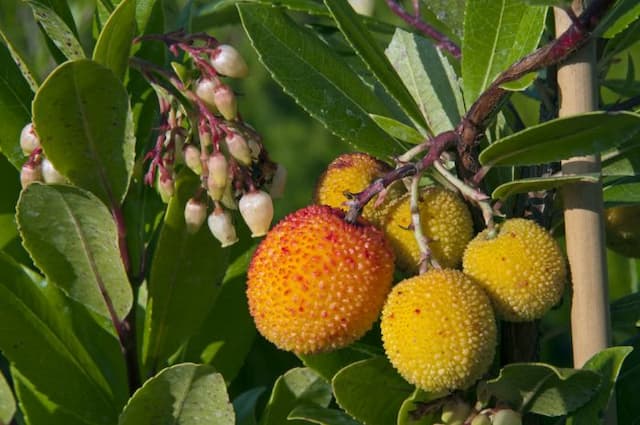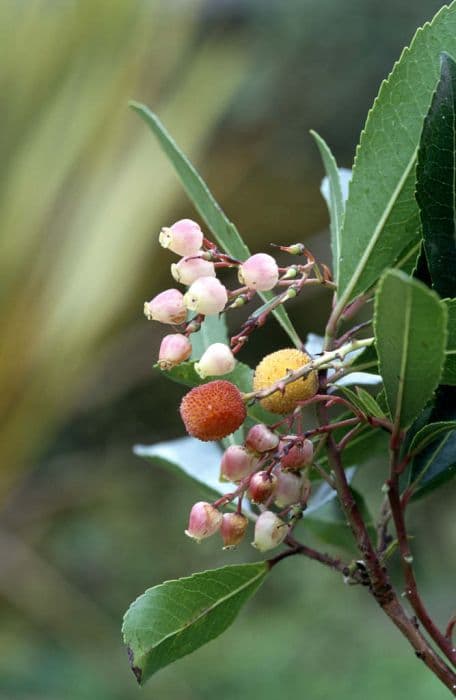Golden Torch Rhododendron Rhododendron 'Golden Torch'

ABOUT
Rhododendron 'Golden Torch' is a visually captivating plant known for its stunning floral displays. The blossoms of this beauty are appropriately named for their rich, golden-yellow color which radiates warmth and brightness in any garden setting. The flowers are bell-shaped with a slightly ruffled edge, exuding an elegant appeal that's further enhanced when they cluster together in large, showy trusses. These floral clusters make a striking contrast against the plant's lush evergreen foliage. The leaves are a deep, glossy green that provide a perfect backdrop to the luminous blooms. Typically oval, the leaves present a leathery texture with a smooth surface, and their edges gently curve downwards, lending the plant a graceful appearance. Their arrangement on the branches can be either whorled or alternate, adding to the plant's visual interest and overall dense, well-structured form. During its blooming season, the Rhododendron 'Golden Torch' transforms into a spectacular vision as the garden is alight with its golden blooms, providing a focal point due to its color and breathtaking presence.
About this plant
 Names
NamesFamily
Ericaceae
Synonyms
Golden Torch Rhododendron, Golden Torch Azalea
Common names
Rhododendron 'Golden Torch'
 Toxicity
ToxicityTo humans
Rhododendrons, including the 'Golden Torch' variety, contain toxic compounds known as grayanotoxins. These substances can be harmful if ingested by humans and can lead to rhododendron poisoning. The symptoms of poisoning may include nausea, vomiting, drooling, diarrhea, blurred vision, headache, and confusion. In severe cases, ingestion can lead to a drop in blood pressure, coma, and even death. It is essential to avoid consuming any part of the rhododendron plant.
To pets
Rhododendrons are also toxic to pets, with the 'Golden Torch' variety having the potential to cause rhododendron poisoning in animals if ingested. Pets, including cats and dogs, may experience symptoms such as drooling, vomiting, diarrhea, weakness, and loss of appetite. More severe cases can result in abnormal heart rate, hypotension, coma, and can be fatal. It is important to keep pets away from all parts of rhododendron plants to prevent poisoning.
 Characteristics
CharacteristicsLife cycle
Perennials
Foliage type
Evergreen
Color of leaves
Green
Flower color
Yellow
Height
3 feet (0.91 meters)
Spread
3 feet (0.91 meters)
Plant type
Shrub
Hardiness zones
5
Native area
Asia
Benefits
 General Benefits
General Benefits- Ornamental Value: Rhododendron 'Golden Torch' is known for its stunning, showy flowers that add visual appeal to any garden or landscape.
- Attracts Pollinators: The vibrant blooms attract bees, butterflies, and other beneficial insects that are crucial for pollination.
- Easy Maintenance: Once established, it requires minimal care and can thrive with basic gardening attention.
- Seasonal Interest: With its spring blossoms, it provides seasonal interest and a burst of color after the winter months.
- Shade Tolerance: It can grow well in partially shaded areas, which makes it versatile for different garden conditions.
- Compact Growth: Its relatively small size and compact growth habit make it suitable for gardens with limited space.
 Medical Properties
Medical PropertiesThis plant is not used for medical purposes.
 Air-purifying Qualities
Air-purifying QualitiesThis plant is not specifically known for air purifying qualities.
 Other Uses
Other Uses- Photography Prop: Rhododendrons 'Golden Torch' can be used as a vibrant backdrop or subject in garden photography, enhancing the visual appeal of the images.
- Aromatherapy Gardens: The pleasant scent of Rhododendron blooms can contribute to a relaxing and therapeutic garden experience, hence it can be included in aromatherapy garden designs.
- Natural Dye: The flowers of the Rhododendron 'Golden Torch' may be used to create natural dyes for fabric or artwork, offering hues ranging from pale yellow to peach.
- Habitat Support: They can provide shelter and nesting opportunities for various bird species, as well as a habitat for beneficial insects.
- Educational Aid: Rhododendrons like 'Golden Torch' can be used in educational settings to teach students about plant growth, botany, and horticulture practices.
- Gastronomic Decor: Although not typically consumed, the petals can serve as a decorative, non-toxic garnish for culinary dishes in high-end cuisine.
- Cultural Significance: In certain cultures, Rhododendrons are symbols of national pride and love, making 'Golden Torch' a suitable choice for cultural festivals and gardens.
- Temperature Moderation: When planted in groups, Rhododendrons can create a microclimate that provides a cooler area in a garden during hot days.
- Artistic Inspiration: The beautiful flowers and structure of the Rhododendron 'Golden Torch' can inspire artists and be featured in various forms of art, from paintings to sculptures.
- Holiday Decor: The vibrant yellow flowers can also be incorporated into festive wreaths or arrangements for spring holidays and celebrations.
Interesting Facts
 Feng Shui
Feng ShuiThe Rhododendron is not used in Feng Shui practice.
 Zodiac Sign Compitability
Zodiac Sign CompitabilityThe Rhododendron is not used in astrology practice.
 Plant Symbolism
Plant Symbolism- Beware: Because many species of Rhododendrons can be toxic, they are sometimes associated with caution or danger.
- Elegance: The Rhododendron 'Golden Torch' has a sophisticated look, which can symbolize elegance or refined beauty.
- Abundance: With their lush, full blooms, Rhododendrons can represent abundance or wealth.
- Taking Care of Oneself: As Rhododendrons require specific growing conditions, they can be a symbol for self-care and ensuring one's own needs are met.
- Survival: Rhododendrons are hardy plants that can grow in challenging conditions, symbolizing the ability to persevere and survive adversity.
 Water
WaterRhododendrons, including 'Golden Torch', prefer consistently moist but well-draining soil. Aim to water them deeply once a week during the growing season, allowing for variations according to weather conditions. The soil should be kept damp but not waterlogged. An average watering might require about 1 to 1.5 gallons, depending on soil type and external conditions. During the winter, reduce watering, but ensure the plant does not completely dry out, which might mean watering every other week or less, depending on your climate.
 Light
Light'Golden Torch' Rhododendron does best in dappled shade or partial sun. They can tolerate morning sun with afternoon shade, or a spot that receives filtered sunlight throughout the day. Full direct sunlight, especially in the afternoon, can lead to scorching of the leaves, so avoid placing these plants in overly sunny spots.
 Temperature
Temperature'Golden Torch' Rhododendron thrives in a moderate climate and prefers temperatures ranging from 40 to 75 degrees Fahrenheit. They can survive minimum temperatures down to about -5 degrees Fahrenheit. To encourage thriving blooms, ensure that the plant is not exposed to extreme heat, as temperatures consistently above 80 degrees Fahrenheit can stress the plant.
 Pruning
PruningPrune 'Golden Torch' Rhododendron to maintain shape and remove dead or diseased branches. This is best done soon after flowering, as pruning later in the season can impact the next year's blooms. Pruning every year is usually not necessary; do so every 2 to 3 years or as needed to manage the size of the plant.
 Cleaning
CleaningAs needed
 Soil
SoilRhododendron 'Golden Torch' prefers well-draining, acidic soil with a pH of 4.5 to 6.0. The best soil mix consists of a combination of sphagnum peat moss, pine bark, and perlite to ensure good aeration and moisture retention without becoming waterlogged.
 Repotting
RepottingGolden Torch Rhododendrons should be repotted every 2 to 3 years. It's best to repot in the spring before new growth starts, using the same acidic soil mixture preferred for planting.
 Humidity & Misting
Humidity & MistingRhododendrons, like 'Golden Torch', thrive in moderate to high humidity levels. Aim for a humidity level of 50-60% for optimal growth.
 Suitable locations
Suitable locationsIndoor
Place Golden Torch Rhododendron in bright, indirect light; keep soil moist.
Outdoor
Plant in dappled shade, protect from wind, water deeply and regularly.
Hardiness zone
5-8 USDA
 Life cycle
Life cycleThe Rhododendron 'Golden Torch', commonly known as Golden Torch Rhododendron, begins its life as a seed, often germinating in spring under favorable conditions of moisture and temperature. After germination, the seedling emerges and enters a juvenile vegetative stage, where it develops a root system and foliage, typically taking several years to mature. As the plant matures, it enters the adult vegetative stage, characterized by robust leaf growth and the establishment of a sturdy structure; during this time, it may also begin to produce flower buds. The next stage is the flowering period, occurring in late spring to early summer, where the Golden Torch Rhododendron produces clusters of trumpet-shaped flowers ranging from pale to deep yellow. After pollination, often by insects, the flowers develop into seed capsules that ripen and eventually release seeds to start the next generation. Finally, the plant may enter a period of senescence as it ages, with reduced flowering and growth, until it eventually dies.
 Propogation
PropogationPropogation time
Spring-Early Summer
The Rhododendron 'Golden Torch', commonly known as the Golden Torch rhododendron, is typically propagated through semi-hardwood cuttings. This method is most effective when carried out during the late summer months, ensuring that the plant material is neither too soft nor too woody. To propagate, a grower would take a cutting approximately 4 to 6 inches (10 to 15 cm) in length, stripping off the lower leaves and possibly treating the cut end with rooting hormone to encourage root development. The cutting is then inserted into a pot filled with a mixture of peat and perlite to provide a well-draining rooting medium. Maintaining a humid environment by covering the pot with a plastic bag or dome and placing it in indirect light encourages the cuttings to root, which usually takes several weeks to a few months depending on conditions. It's important to keep the soil moist but not waterlogged to prevent rot.









